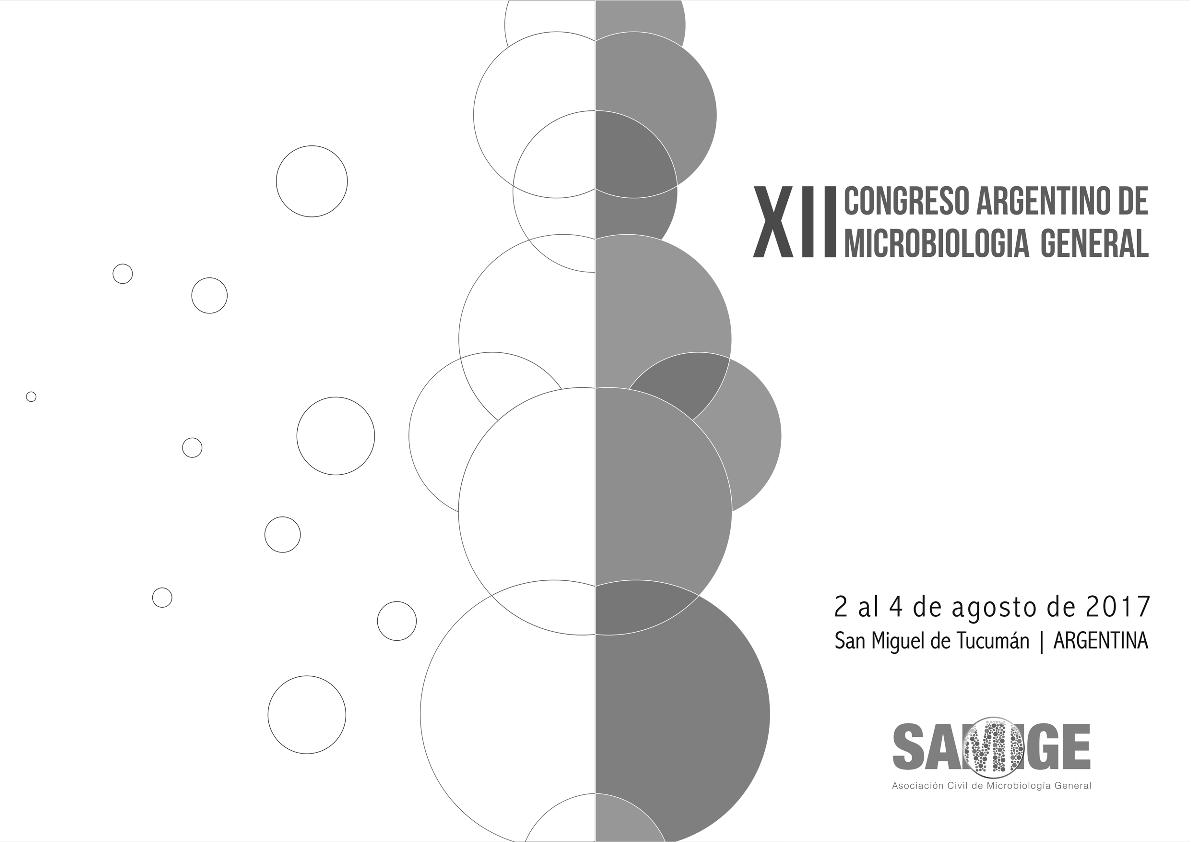Mostrar el registro sencillo del ítem
dc.contributor.author
Merino, Lina Ethel

dc.contributor.author
Trejo, Fernando Miguel

dc.contributor.author
de Antoni, Graciela Liliana

dc.contributor.author
Golowczyc, Marina Alejandra

dc.date.available
2022-09-13T10:47:13Z
dc.date.issued
2019
dc.identifier.citation
Biofilm producing lactic acid bacterial as an alternative to control food contaminations; XII Congreso Argentino de Microbiología General; San Miguel de Tucuman; Argentina; 2017; 1-3
dc.identifier.uri
http://hdl.handle.net/11336/168455
dc.description.abstract
Biofilms are complex structures of microorganisms that colonize various biotic or abiotic surfaces. These organized communities are formed by bacteria embedded in a highly hydrated extracellular matrix that is composed mainly of polysaccharides, proteins, DNA and other substances. Several bacterial surface structures are necessary for this surface adhesion and an environment that favors the formation of biofilm against planktonic growth is required. The presence of biofilms is common in food industry and represents a concern because bacteria can adhere to almost any type of surface,such as plastic, metal, glass, soil particles and wood. Lactic bacteria are generally recognized as safe (GRAS) and could be an alternative for the biocontrol of pathogenic microorganisms biofilms forming in the food production chain. Use of probiotic biofilms can be an alternative approach for reducing the formation of pathogenic biofilms in food industries.The objective of this work was to study the biofilm production of lactic acid bacteria in different substrates and in different surfaces such as plastic, glass and stainless steel, commonly used in food industry. Biofilm formation was measured by violet crystal and plaque counts of seven strains of lactobacilli: Lb. kefiri CIDCA 83113, CIDCA 8321, CIDCA 8344 and CIDCA 5818, Lb. plantarum CIDCA 83114 and CIDCA 8327 and Lb. delbrueckii subsp. lactis CIDCA 133. These have different characteristics such as presence of S-layer, exopolysaccharide or glucan production, autoaggregation and hydrophobicity.The percentage of autoaggregation by decreasing OD at 600 nm and the percentage of hydrophobicity by partition in hexadecane and xylene (MATH method) was measured. For measurement of biofilmformation, 1 ml of medium (MRS and BHI) was inoculated with lactobacilli in 24 wells culture plates.For viable counts, the adhered bacteria were resuspended in PBS and counted in MRS agar plates.Only Lb. kefiri CIDCA 8321 and CIDCA 8344 strains presented a percentage of autoaggregationgreater than 50%. Both strains also showed the highest hydrophobicity. None of the lactobacilli tested form biofilm in BHI medium. On the other hand, except for CIDCA 8321 strain that did not develop biofilm on any probed condition, the lactobacilli can form biofilm in MRS medium. The lowest biofilm production was observed in plastic, whereas in glass and stainless steel lactobacilli present high capacity of biofilm formation. It is remarkable that Lb. plantarum CIDCA 83114 is the one with the highest capacity for biofilm formation in the three surfaces studied, being stainless steel the most suitable surface for biofilm production. We observed that both hydrophobic and hydrophilic strains are capable of producing biofilm. We demonstrated that lactobacilli can form biofilm and this property depends on surface and growth media. This could be used as an alternative control of food pathogens.
dc.format
text/plain
dc.language.iso
eng
dc.publisher
Asociación Civil de Microbiología General
dc.rights
info:eu-repo/semantics/openAccess
dc.rights.uri
https://creativecommons.org/licenses/by-nc-sa/2.5/ar/
dc.subject
BIOFILMS
dc.subject
BIOFILMS
dc.subject
LACTOBACILLI
dc.subject
LACTOBACILLI
dc.subject.classification
Otras Ciencias Naturales y Exactas

dc.subject.classification
Otras Ciencias Naturales y Exactas

dc.subject.classification
CIENCIAS NATURALES Y EXACTAS

dc.title
Biofilm producing lactic acid bacterial as an alternative to control food contaminations
dc.type
info:eu-repo/semantics/publishedVersion
dc.type
info:eu-repo/semantics/conferenceObject
dc.type
info:ar-repo/semantics/documento de conferencia
dc.date.updated
2022-06-13T15:51:33Z
dc.journal.pagination
1-3
dc.journal.pais
Argentina

dc.journal.ciudad
San Miguel de Tucumán
dc.description.fil
Fil: Merino, Lina Ethel. Provincia de Buenos Aires. Gobernación. Comisión de Investigaciones Científicas. Centro de Investigación y Desarrollo en Criotecnología de Alimentos. Consejo Nacional de Investigaciones Científicas y Técnicas. Centro Científico Tecnológico Conicet - La Plata. Centro de Investigación y Desarrollo en Criotecnología de Alimentos. Universidad Nacional de La Plata. Facultad de Ciencias Exactas. Centro de Investigación y Desarrollo en Criotecnología de Alimentos; Argentina
dc.description.fil
Fil: Trejo, Fernando Miguel. Provincia de Buenos Aires. Gobernación. Comisión de Investigaciones Científicas. Centro de Investigación y Desarrollo en Criotecnología de Alimentos. Consejo Nacional de Investigaciones Científicas y Técnicas. Centro Científico Tecnológico Conicet - La Plata. Centro de Investigación y Desarrollo en Criotecnología de Alimentos. Universidad Nacional de La Plata. Facultad de Ciencias Exactas. Centro de Investigación y Desarrollo en Criotecnología de Alimentos; Argentina
dc.description.fil
Fil: de Antoni, Graciela Liliana. Provincia de Buenos Aires. Gobernación. Comisión de Investigaciones Científicas. Centro de Investigación y Desarrollo en Criotecnología de Alimentos. Consejo Nacional de Investigaciones Científicas y Técnicas. Centro Científico Tecnológico Conicet - La Plata. Centro de Investigación y Desarrollo en Criotecnología de Alimentos. Universidad Nacional de La Plata. Facultad de Ciencias Exactas. Centro de Investigación y Desarrollo en Criotecnología de Alimentos; Argentina
dc.description.fil
Fil: Golowczyc, Marina Alejandra. Provincia de Buenos Aires. Gobernación. Comisión de Investigaciones Científicas. Centro de Investigación y Desarrollo en Criotecnología de Alimentos. Consejo Nacional de Investigaciones Científicas y Técnicas. Centro Científico Tecnológico Conicet - La Plata. Centro de Investigación y Desarrollo en Criotecnología de Alimentos. Universidad Nacional de La Plata. Facultad de Ciencias Exactas. Centro de Investigación y Desarrollo en Criotecnología de Alimentos; Argentina
dc.relation.alternativeid
info:eu-repo/semantics/altIdentifier/url/http://www.samige.org.ar/admin/news/files/108-Libro%20SAMIGE%202017.pdf
dc.conicet.rol
Autor

dc.conicet.rol
Autor

dc.conicet.rol
Autor

dc.conicet.rol
Autor

dc.coverage
Nacional
dc.type.subtype
Congreso
dc.description.nombreEvento
XII Congreso Argentino de Microbiología General
dc.date.evento
2017-08-02
dc.description.ciudadEvento
San Miguel de Tucuman
dc.description.paisEvento
Argentina

dc.type.publicacion
Book
dc.description.institucionOrganizadora
Asociación Civil de Microbiología General
dc.source.libro
XII Congreso Argentino de Microbiología General
dc.date.eventoHasta
2017-08-04
dc.type
Congreso
Archivos asociados
